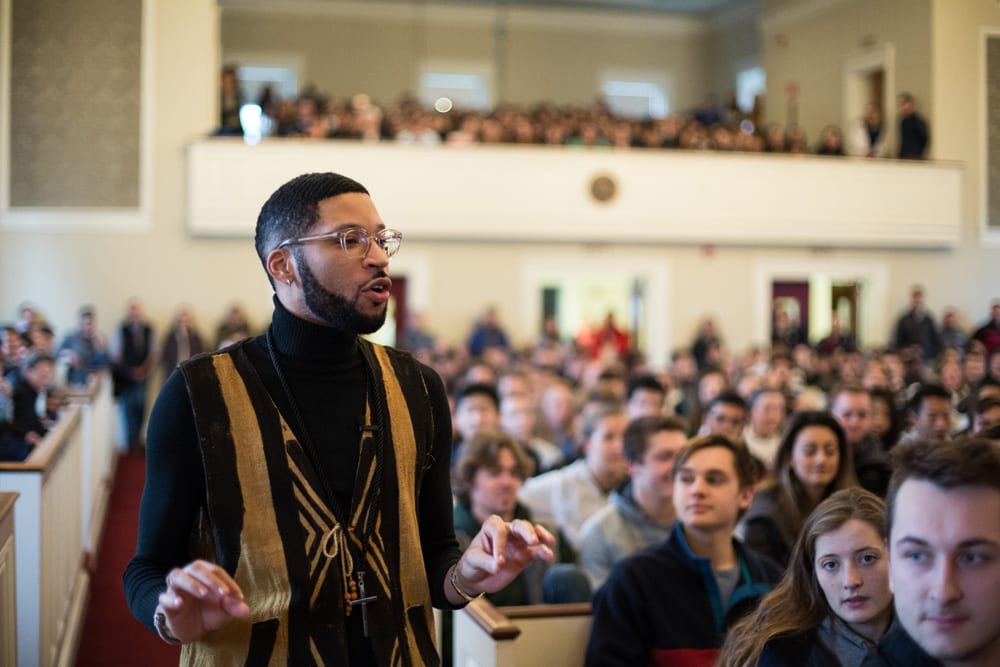The morning of Why Not Speak Day began without a word, but it did not begin in silence. Tori Zingarelli ’18 calmly walked to the front of the Phillips Stevens Chapel, full with students, faculty, and staff. As the boisterous audience hushed, music sounded and she began singing “I Know Where I’ve Been” from the musical Hairspray! clearly and with conviction. Dancers Triniti Slaughter ’18, A’kayla Williams ’18, and Jamie O’Malley ’20, all dressed in black, arrived on stage and began to move. It was a powerful beginning to an important day with a special schedule that included speakers and more than 60 student- and faculty-led workshops addressing the theme The Identity Toolkit.
After the performance, which received a standing ovation, Dean of Inclusion Erin Davey introduced the Why Not Speak Day keynote speaker, Rev. E. Taylor Doctor (“a beam of light,” she called him). Doctor spoke at last year’s inaugural WNS Day to great acclaim. As he spoke, he walked up and down the aisles of the chapel in what became a conversation about how names and labels impact identity.
“Names are big in our world,” he said. “Things associated with names get assigned a value.” For example, he said, a Caesar salad in Hollywood might cost $25. It’s romaine lettuce, Caesar dressing, some parmesan cheese on top, and some croutons for crunch, he said, but you’re paying more because you’re in an expensive town with an exclusive name.
Staying on the topic of food, he asked a student what his favorite snack was. The answer was KitKat chocolate bars. What are the ingredients on the label, Doctor asked. The student replied that there were a lot of ingredients he couldn’t pronounce on package.
“Labels can be deceiving,” Doctor replied.
“Has anyone been labeled?” he asked the audience. Lots of people nodded yes. Theater teacher Emily Ditkovski said someone once called her selfish, but that she didn’t think that label was fair.
“Has anyone ever been labeled, and instead of deciding whether or not to accept the label, you just accepted it? Or maybe you accepted at the time, before thinking about it? Or even if you didn’t accept it, you just absorbed it a little?”
“Be selfish about the label you absorb,” he concluded. “Then you are able to own your own power.”
When people use labels broadly, instead of knowing individuals, populations can be marginalized, he said. He asked for suggestions of groups that have been pushed aside and for labels people use for these groups. Students called out that Muslims have been labeled “terrorist”; African Americans have been labeled “lazy”; immigrants have been labeled “alien”; women have been labeled “incompetent.”
“What happens when we flip the label?” he asked.
Doctor, who called himself “unabashedly black, unashamedly gay, and proud to be a Christian,” said we need to move beyond mere labels as we move through the world. As a black man, he said his 90-year-old mother taught him to be resilient, as did many mothers in African-American families. “We are a community that is proud and resilient,” he said, illustrating how to transform a label that does harm and isn’t relevant.
When he asked for alternate labels for Muslims, he heard suggestions, such as “devout,” “family-oriented,” “compassionate.” Women are “strong,” “capable,” “optimistic.” Immigrants are “hard-working,” “disciplined.”
“When we flip the myth of labels, we are our names,” he concluded. “Not our backgrounds, not our environments, not our upbringings, not our stations in life, not our destination on the journey. We are our names. And our names are enough. And that gives us permission to just be. Forget the labels, forget what the world wants to you know about yourself,” he said. “Just call me by my name. There is power in names.”
Zingarelli said she was uplifted by Rev. Doctor’s talk. “His wise words about freeing everyone of labels and allowing each individual to be who they want to be was a beautiful and profound message,” she said. “I loved his enthusiasm and interaction with the audience as well. He truly was phenomenal and his energy was perfect to start opening of the day!”
For Davey, the speech was a powerful opening to a transformative day. “As I looked back on the events of yesterday’s Why Not Speak Day,” she said, “I saw our community engaging in meaningful discussions, challenging preconceived notions, reflecting on what it means to ‘label’ others, and questioning how we would respond to a difficult obstacles in our lives. I’m grateful to the Williston community for opening their minds and hearts to those who had something powerful to share.”
Find photos from Why Not Speak Day here.

